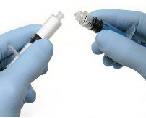



Intervet's Bird Flu Vaccine Receives EU License
BOXMEER - Intervet, a leading animal health company, received approval for its bird flu (avian influenza) vaccine Nobilis(R) Influenza H7N1. As a result, Europe now has a licensed vaccine to protect birds against the H7 field strain.
The CVMP (Committee for Medicinal Products for Veterinary use) highlighted the fact that the current concerns about avian influenza have mainly focused on H5 strains, but that the danger posed by H7 strains should not be ignored. The world has been suffering from H7 outbreaks for seven years. The Netherlands (2003) and Italy (1999-2000) already reported infections of H7 avian influenza. Similar to H5N1, birds with the H7 avian influenza virus can infect humans, as has been demonstrated in the Netherlands in 2003. The outbreaks resulted in 30 millions birds being culled in the Netherlands, and 13 millions birds in Italy.
Paul van Aarle, Director Institutional Sales at Intervet said: "It is necessary to be prepared for potential outbreaks caused by the H7 virus. Therefore Intervet developed this product and applied for European registration. Fortunately the CVMP/EMEA took the same position and reviewed the vaccine under the accelerated registration procedure. This is an excellent example of how industry and regulators can take their joint responsibility towards society."
The vaccine protects against the different varieties of the highly pathogenic H7 field strain. If embedded in national control programs, vaccination contributes substantially to controlling bird flu and reducing the circulation of the virus in the bird population. By reducing the amount of virus in the field, the chance on infection of people is reduced.
The vaccine contains inactivated virus, and has to be injected in order to get a full immune response. Intervet research is investigating the possibilities for a new vaccine type for mass application avoiding injection.
It is important to differentiate between infected and vaccinated animals. Birds vaccinated with H7N1 produce a different set of antibodies than those birds infected with other variants of the H7 field strain. These antibodies can be monitored using specific diagnostic tests.
With a growing list of countries already using Nobilis(R) Influenza successfully in official governmental avian flu control programs, Intervet has accumulated a wealth of experience in the use of vaccines against bird flu. The company has been working with national governments and international organizations to advise on outbreak control and management as well as vaccination strategies aimed at helping bring avian influenza to a halt.












